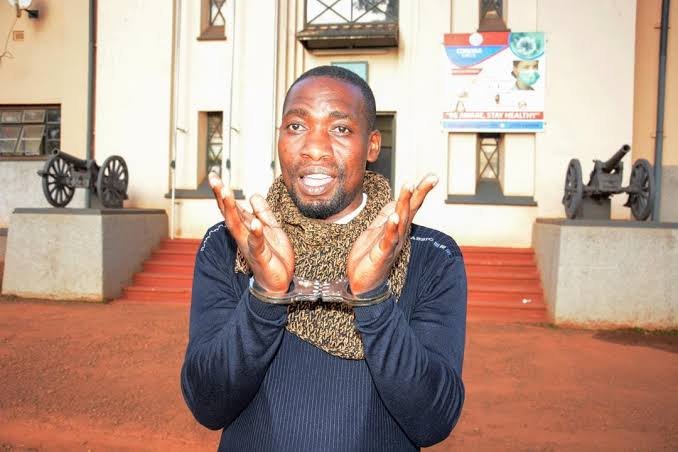Ugandan Journalist Dean Saava Remanded Over Illegal Broadcasting and Defamation Charges
KAMPALA – The Ugandan media landscape is facing renewed scrutiny following the arrest and remand of journalist Dean Saava, who faces serious charges including illegal broadcasting and defamation of senior government officials. The case, which highlights the ongoing tensions between regulatory bodies and digital media practitioners, has sparked conversations about press freedom and regulatory compliance in Uganda’s evolving media environment.
Saava, who operates an online television station, was presented before the Court of Chief Magistrates in Kampala, which heard allegations that he willfully defied directives from the Uganda Communications Commission (UCC). The prosecution successfully argued that the journalist should remain in custody until his bail application is formally heard, citing the seriousness of the charges against him.
Charges and Regulatory Standoff
The case against Saava centers on three primary accusations that paint a picture of a deliberate flouting of Uganda’s communications laws. According to court documents, the journalist stands accused of operating an online television station without the required UCC license, knowingly defying specific directives from the communications regulator, and using his platform to defame high-profile Ugandan personalities, including Prof. Ddungu Kateregga.
The UCC, which serves as Uganda’s primary communications regulatory body, maintains that Saava was given multiple opportunities to regularize his operations but consistently chose non-compliance. Dr. Abdul Salaam Waiswa, UCC’s head of legal affairs, emphasized that the Commission followed due process in attempting to bring the online broadcaster into compliance with national regulations.
“We engaged him several times, even suspended his operations last August. But instead of complying, he resorted to insulting the Commission and government leaders,” Dr. Waiswa told reporters after the ruling.
This case emerges against a backdrop of increasing regulation of Uganda’s digital media space, with authorities expressing concern about the proliferation of unlicensed online broadcast platforms. The UCC has repeatedly emphasized that all broadcasters, regardless of their platform, must adhere to the same licensing requirements and content standards as traditional media outlets.
According to the initial report from Nile Post, which first broke the story, the regulatory body had previously suspended Saava’s operations in August, giving him a clear path to compliance that allegedly went unheeded. Instead, prosecutors claim the journalist escalated his activities, using his platform to target senior figures with inflammatory content.
This developing legal battle highlights the complex relationship between media regulation and press freedom in Uganda. For comprehensive coverage of this and other important national stories, readers can follow updates through reliable sources like African News Desk’s Uganda news section, which provides balanced reporting on matters of public interest.
Legal Proceedings and Press Freedom Implications
In court, prosecutors revealed that their investigation into Saava’s activities is complete and that witnesses are prepared to testify against the journalist. The state’s case appears to rely heavily on documented interactions between Saava and the UCC, including official correspondence and records of the alleged defamatory broadcasts.
Despite the prosecution’s assertions, Saava maintained his innocence during court proceedings, formally denying all charges against him. The journalist claimed to have no knowledge of any wrongdoing, setting the stage for a potentially protracted legal battle that could have significant implications for Uganda’s online media ecosystem.
“Court was informed that investigations into the case are complete and witnesses are ready to testify. Despite this, Saava denied all charges, maintaining that he has no knowledge of any wrongdoing.”
Media rights advocates are closely monitoring the case, expressing concern about the potential chilling effect on digital journalism in Uganda. The application of defamation laws against journalists has been a subject of international scrutiny, with press freedom organizations arguing that such charges can sometimes be used to suppress critical reporting.
Meanwhile, regulatory authorities maintain that their actions are solely aimed at maintaining order in the broadcast sector and protecting individuals from unfounded attacks. The UCC has consistently stated that it supports media freedom but insists that all operators must function within the established legal framework.
The case raises important questions about the balance between regulatory oversight and press freedom in the digital age. As online broadcasting becomes increasingly accessible, regulators worldwide are grappling with how to apply existing broadcast laws to new media platforms without stifling innovation or freedom of expression.
In Uganda, where the media landscape includes both traditional outlets and a growing number of digital platforms, this case may set important precedents for how online broadcasters are treated under the country’s communications laws. The outcome could influence whether other unlicensed online platforms seek to regularize their operations or continue operating outside the regulatory framework.
As the legal process continues, both media freedom advocates and regulatory authorities will be watching closely. The case represents a critical test case for Uganda’s approach to media regulation in the digital era, with potential implications for how similar situations are handled across East Africa and beyond.
For now, Saava remains in custody awaiting the formal hearing of his bail application, while the journalism community and regulatory bodies alike await a resolution that could reshape the boundaries of online broadcasting in Uganda.


